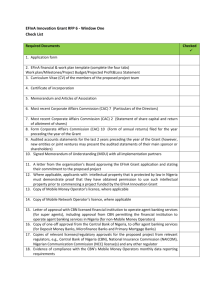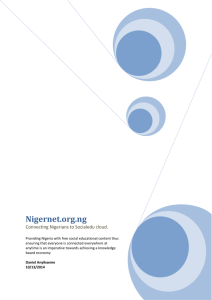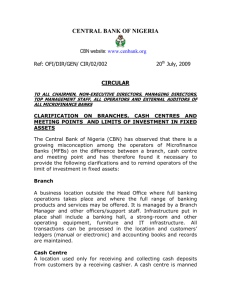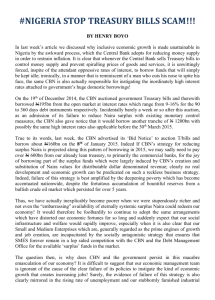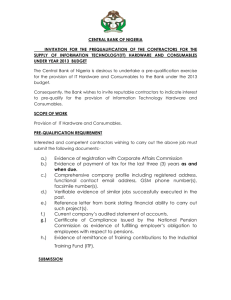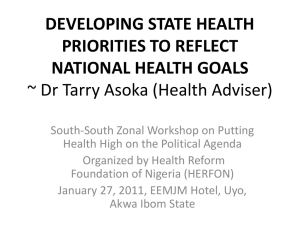Asian Journal of Business Management 6(1): 9-13, 2014
advertisement
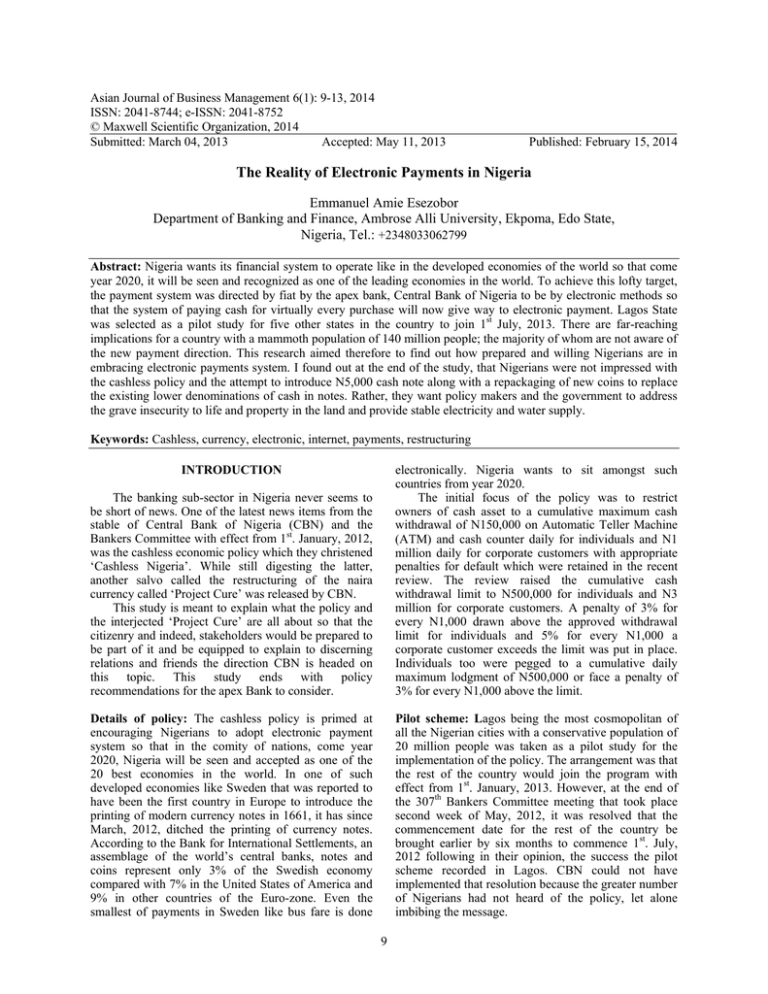
Asian Journal of Business Management 6(1): 9-13, 2014 ISSN: 2041-8744; e-ISSN: 2041-8752 © Maxwell Scientific Organization, 2014 Submitted: March 04, 2013 Accepted: May 11, 2013 Published: February 15, 2014 The Reality of Electronic Payments in Nigeria Emmanuel Amie Esezobor Department of Banking and Finance, Ambrose Alli University, Ekpoma, Edo State, Nigeria, Tel.: +2348033062799 Abstract: Nigeria wants its financial system to operate like in the developed economies of the world so that come year 2020, it will be seen and recognized as one of the leading economies in the world. To achieve this lofty target, the payment system was directed by fiat by the apex bank, Central Bank of Nigeria to be by electronic methods so that the system of paying cash for virtually every purchase will now give way to electronic payment. Lagos State was selected as a pilot study for five other states in the country to join 1st July, 2013. There are far-reaching implications for a country with a mammoth population of 140 million people; the majority of whom are not aware of the new payment direction. This research aimed therefore to find out how prepared and willing Nigerians are in embracing electronic payments system. I found out at the end of the study, that Nigerians were not impressed with the cashless policy and the attempt to introduce N5,000 cash note along with a repackaging of new coins to replace the existing lower denominations of cash in notes. Rather, they want policy makers and the government to address the grave insecurity to life and property in the land and provide stable electricity and water supply. Keywords: Cashless, currency, electronic, internet, payments, restructuring The banking sub-sector in Nigeria never seems to be short of news. One of the latest news items from the stable of Central Bank of Nigeria (CBN) and the Bankers Committee with effect from 1st. January, 2012, was the cashless economic policy which they christened ‘Cashless Nigeria’. While still digesting the latter, another salvo called the restructuring of the naira currency called ‘Project Cure’ was released by CBN. This study is meant to explain what the policy and the interjected ‘Project Cure’ are all about so that the citizenry and indeed, stakeholders would be prepared to be part of it and be equipped to explain to discerning relations and friends the direction CBN is headed on this topic. This study ends with policy recommendations for the apex Bank to consider. electronically. Nigeria wants to sit amongst such countries from year 2020. The initial focus of the policy was to restrict owners of cash asset to a cumulative maximum cash withdrawal of N150,000 on Automatic Teller Machine (ATM) and cash counter daily for individuals and N1 million daily for corporate customers with appropriate penalties for default which were retained in the recent review. The review raised the cumulative cash withdrawal limit to N500,000 for individuals and N3 million for corporate customers. A penalty of 3% for every N1,000 drawn above the approved withdrawal limit for individuals and 5% for every N1,000 a corporate customer exceeds the limit was put in place. Individuals too were pegged to a cumulative daily maximum lodgment of N500,000 or face a penalty of 3% for every N1,000 above the limit. Details of policy: The cashless policy is primed at encouraging Nigerians to adopt electronic payment system so that in the comity of nations, come year 2020, Nigeria will be seen and accepted as one of the 20 best economies in the world. In one of such developed economies like Sweden that was reported to have been the first country in Europe to introduce the printing of modern currency notes in 1661, it has since March, 2012, ditched the printing of currency notes. According to the Bank for International Settlements, an assemblage of the world’s central banks, notes and coins represent only 3% of the Swedish economy compared with 7% in the United States of America and 9% in other countries of the Euro-zone. Even the smallest of payments in Sweden like bus fare is done Pilot scheme: Lagos being the most cosmopolitan of all the Nigerian cities with a conservative population of 20 million people was taken as a pilot study for the implementation of the policy. The arrangement was that the rest of the country would join the program with effect from 1st. January, 2013. However, at the end of the 307th Bankers Committee meeting that took place second week of May, 2012, it was resolved that the commencement date for the rest of the country be brought earlier by six months to commence 1st. July, 2012 following in their opinion, the success the pilot scheme recorded in Lagos. CBN could not have implemented that resolution because the greater number of Nigerians had not heard of the policy, let alone imbibing the message. INTRODUCTION 9 Asian J. Bus. Manage., 6(1): 9-13, 2014 • In the press of 27th. February, 2013 was a report that the Bankers Committee at their last meeting, took a resolution that the cashless policy be extended to Rivers and Ogun States in addition to Kano, Anambra and Abia States with effect from 1st. July, 2013. These states have capitals in Port Harcourt, Abeokuta, Kano, Awka and Umuahia respectively where cash transactions are reputed to be very high.Anambra State also hosts Onitsha while Abia State has Aba-two major Nigerian cities noted for commerce, resourcefulness and mechanical parts fabrication. There are 36 states in Nigeria. The 5 states listed above and Lagos, the pilot state makes only 6 states scheduled to benefit from the cashless policy for now. This research will therefore endeavor to show the degree of awareness for the cashless policy and the willingness of Nigerians to accept the new N5,000 cash note and revert to the use of coins in the currency restructuring exercise. THEORETICAL BACKGROUND Adeyeye (2012) posits that conceptual and theoretical framework of this subject is based on the inventory “Theoretical Model of the Transactions Demand for Cash” by Baumol (1952) and Tobin (1956). Baumol and Tobin showed that the optimal withdrawal amount is proportional to the square root of the total value of transactions and indirectly proportional to the square root of interest rates. This means that if the transactions value declines by 1%, the amount withdrawn will decline by 0.5%. Since average cash holdings in this model are half the withdrawal amount, this percentage change in the withdrawal amount implies the same percentage change in average cash balances. Generally, when considering how much and how frequently to draw cash, bank users consider the cost incurred per withdrawal and interest to be lost on the cash withdrawn. The postulations of Markose and Loke (2003) some 47 years later had a direct bearing on the earlier version of Baumol and Tobin. They advanced a model after a study of electronic payment system that a decline in cash transactions has a proportional effect on optimal cash holdings. Thus, with a transaction elasticity of 0.5 for example, a 10% decline in the percentage share of cash payment will yield a 5% decline in cash holdings. In Nigeria, the focus is not necessarily the proportion between transactions drawing and cash holding but a direction towards promoting a cashless economy that is, electronic banking with a view to achieving the objectives highlighted above. Exemptions: In February, 2012, CBN exempted foreign diplomatic missions, discount houses and micro-finance banks from the policy. This was sensible in order not to stifle their operations. Objectives of policy: Why for the love of naira would its chief protector, CBN enunciate such protective policies for its baby? The following were adduced as the objectives of the policy: • • • • • • • • • It will encourage more Points Of Sale (POS) to emerge in filling stations, supermarkets and other service centers. The cost of printing the naira currency notes and effectively handling it are prohibitive. The CBN Governor estimates that N192 billion would have been spent by the end of 2012. That huge sum of money could easily be saved by encouraging Nigerians to adopt e-payment rather than carrying cash all over the place. Policy will minimize revenue corruption and leakages. May be, e-payment will dissuade paid government officials from stealing and hiding as much as N2 billion in their homes as was recently adduced to a top civil servant (although vehemently denied). Definitely, armed robbers will be put out of business to save Police and customers’ casualties and growing anxiety of bank workers. It will promote financial intermediation and financial inclusion in the Nigerian economy. E-payment will raise the level of foreign confidence in the economy and encourage foreign direct investments. It will minimize queues in the banking halls of banks to allow bankers to concentrate on study work. Gradually, banks will reduce branch network and unfortunately, render many bankers redundant. Policy will improve financial efficiency and facilitate the formulation and implementation of monetary policies. It will also make easy, tax collection since most transfers would be documented as e-payment. Facilities for electronic payment: Electronic payment and indeed electronic banking can only strive where there is widespread use of the following facilities: • • • • • 10 Internet, the modern information highway Automatic Teller Machine (ATM) Mobile telephone to facilitate telephone banking Computer POS machines in supermarkets, banks, schools and other payment centers to accept ATM and credit cards for payment. Asian J. Bus. Manage., 6(1): 9-13, 2014 • Other Electronic Cards such as debit, credit and realisable cards which have to be reloaded from time to time in the banks and used also for payment. • • The companies that provide such electronic cards are called switching companies and are currently over fifty in the country. Notable amongst them are: • • • • • • Interswitch Value Card/VISA CTL/Master Card E Transact E Wallet, etc. • Fears for a cashless Nigeria: The following according to Esezobor (2010), can be considered the challenges of electronic payment system in Nigeria: • • • • • • • • • The human rapport between customers and counter officers in banks will disappear. Suffice it to say that the human touch in banking will be a thing of the past. Publicity of the policy has been pedestal and localized to Abuja and Lagos, respectively the current capital city and previous capital city of the country. When will the grassroots be targeted and adequately carried along? There is no specific law to regulate e-payment or at least, to discourage cash transaction in favour of epayment. The new cash limits make the policy an issue for the upper class of Nigerians who can do business within and beyond the stated limits per day. Clearly, more than 95% of Nigerians who are peasants surviving on less than a dollar a day, will not be affected by the new cash policy. The perennial unreliable electricity supply can at any time, throw spanner in the works. Without power, nothing serious works. The banks can afford heavy duty generators. What about the small and medium scale enterprises as well as individuals? The internet shuts down when there is power outage. Cellular phones cannot be charged either. ATM is still the show of city centers. Rural branches of banks do not have them. Thus, rural dwellers have never seen an ATM. Same with POS. CBN may consider subsidizing the acquisition of POS machines for widespread use. Computers do not come cheap. A good laptop goes for at least N70,000. How many Nigerians can afford that and have back-ups to prevent total loss of information in an emergency? Dearth of skilled manpower to man the various equipment and effect necessary repairs when necessary. Where will the banks find the engineers to man their systems nationwide and in the West African sub-region where they now have branches? Insecurity and fraud are in the upsurge. Serial fraudsters hack into substantial accounts and ferret funds through ATM, POS and fake transfers. ‘Cashless Nigeria’ will gradually cause the lay-off of long-serving bankers for machines to take their place. It is already happening. ATM encourages excessive withdrawal and profligacy. One can stop over in any bank on a weekend on the way to a party to withdraw cash when an account is funded since banks share the same terminal. Low acceptance of ATM, POS, telephone banking and use of credit cards. The elderly Nigerians do not seem to trust them especially those who in the past, lost money through ATM. High cost of switching services. The cost is higher to users when facilities are used abroad during visits. That switching companies use private power supply to ensure reliability of services accounts for the high costs. B.3. Proposed Introduction of N5,000 Cash Note: The Governor of CBN has recently been under the firing line again for his proposal to introduce N5,000 cash note amongst other things with effect from early next year in a comprehensive currency restructuring exercise called ‘Project Cure.’ The lower cash denominations of N5, N10 and N20 will as part of the policy, be converted to coins while the existing N500, N200, N100 and N50 notes would be re-designed. The cost of the proposal, which received Presidential imprimatur on 19th December, 2011, would gulp a whopping N40.3 billion (the CBN has denied this amount without stating the correct amount). The new N5,000 note will bear the images of three prominent women; one each from the East, North and West of Nigeria. The public outcry against it appears wholesale on the ground that it is antithetical to the ‘Cashless Policy’. Although the National Assembly has suspended the proposal to allow for further consultation (whatever that means), there are a few merits in it. First, it will drastically reduce the cost of printing, movement, storage, insurance and distribution of currency notes. One wrap of N5,000 notes will be N500,000 as against N100,000 for the N1,000 cash notes, the existing highest denomination. One packet or a bundle usually tied with twine, will be N5 million. There will be no need to use fanciful bags to haul currency and be exposed to the ravages of armed robbers since up to N10 million could easily be concealed in ‘babanriga or agbada’, the common overflowing gowns of Nigerians. Banks’ ATM will also dispense cash of up to N200,000 in one attempt. Features we are told, have been added to make counterfeiting difficult. There are tactile marks to 11 Asian J. Bus. Manage., 6(1): 9-13, 2014 aid the visually impaired. The restructuring is an opportunity to eliminate dependence on existing patents on naira held by non-Nigerians. CBN in the Daily Sun (2012) newspaper of 8th. September, 2012 showed evidence that in the past, the introduction of higher denominations rather than raise the level of inflation led to a reduction in prices. Further informed contributions hold that the new N5,000 note will because of its portability, reduce the rush for dollars since rich Nigerians like to hold their store of value in dollar. Members of the National Economic Management Team (NEMT) after their meeting on 29th. August, 2012, effusively supported the currency restructuring while assuring that neither inflation nor corruption would be worse off for it. However, the argument of the general public is that the introduction of N5,000 cash note will surely worsen the quality of life for the greater number of Nigerians who have no access to public till. More money will automatically be pumped into the economy thereby exacerbating the level of inflation. If this will not be, CBN should state how much they would mop up from the system for an equivalent amount in the N5,000 note to be put in circulation, to avoid excessive money chasing few goods and services, that is, inflation. Inflation it must be emphasized, is not entirely bad because inflation encourages increased economic activities and more employment. Corruption, whether in bribe or in unwilling thank you, will take top flight just as money laundering will blossom. From past experience, Nigerians do not cherish the use of coins. The fear is that the proposed new coins would simply be disregarded thereby raising prices from N50 for the smallest purchase. The mega rich Nigerians appear to be well protected with issues like cashless policy and currency restructuring. Nothing is in both policies for the common man. The Nigeria Labour Congress has threatened to demand for higher wages because according to them, the innovation will affect the purchasing power of the naira. The Governor of Benue State, Mr. Gabriel Suswam has expressed shock at the restructuring because in his words, ‘at no time was the proposal discussed at the National Economic Council meeting to carry the State Governors along’. Since its announcement, there has been series of other protests against the restructuring. As at the time of this study, the protest is not abating not least from Chief Olusegun Obasanjo, former President/Commander-in-Chief of Nigeria who spoke against the restructuring. Lagos Chamber of Commerce and Industry has warned that the N5, 000 notes will trigger currency counterfeiting. In less than three years from now precisely 1st. January, 2015, the naira will cease to be for a new currency called the Eco to be the legal tender in the member states of West African Monetary Zone comprising The Gambia, Guinea, Liberia, Sierra Leone, Ghana and Nigeria. So why all the trouble if the naira will die in less than 22 months from now? Could it be that Nigeria does not believe in the ideals of a single currency for the Economic Community for West African States (ECOWAS) and yet serves as the secretariat for ECOWAS Commission? Within eight months, CBN developed two policies Nigerians do not seem to applaud; the first, Cashless Nigeria-not sufficiently publicized for the grassroots to grapple with and now, this one which appears to run counter to the former in philosophy to the consternation of Nigerians. METHODOLOGY The field study was undertaken by means of questionnaire administered to 1,800 Nigerians in the six geo-political zones in the country through quota sampling. The questionnaires were administered by post and returned in the self-addressed envelope provided. The erratic power supply and high cost of activating an internet modem discourage questionnaire administration by electronic means. RESULTS AND DISCUSSION Of the sample size, only 1,200 responded as at the time of amending this study. 402 said they had heard of electronic payment because they use ATM to draw cash. Such users complained that most ATM does not work and they have to go from bank to bank to find out which bank’s ATM was functional. They also complained of long queues to use the ATM which at times, processes the withdrawal instruction but would not dispense the cash required The affected account would all the same be debited when no cash was dispensed. It takes a personal visit to the bank to complete the complaint form for the wrong debit to be reversed in 48 hours thereafter. If the victim was hardpressed for cash, the bank would arrange an overdraft and be happy to charge interest for the 48 hours the legitimate credit was seized. Beyond the use of ATM, only 43 agreed they have used the facility of electronic transfer to send money to relations. A whooping 928 said they were not aware of the methods of sending money by electronic means in banks. A good number, 1056 said they have seen the advertisement in banks that Nigeria is turning to a cashless country. But they ask “What is it about”? On the suggestion that electronic payments will gradually take over the cash payment system in the market place, a majority, 954 respondents, said Nigeria was not ripe for it and feared that it will give banks the opportunity to swindle customers the more. One thousand and sixty eight (1,068) said they have never seen a swipe card or point of sale machine. 12 Asian J. Bus. Manage., 6(1): 9-13, 2014 Obviously, they were not aware that their ATM card is a swipe card acceptable for point of sale payment. Beyond the state capitals and big commercial cities like Warri, Agbor, Ijebu Ode and a few others that have self-service supermarkets, what we have in most Nigerian towns and villages are provision shops where the buyerstanding by a barricade, tells the shop owner what items he requires and they are brought to the counter for cash payment. Six hundred and eleven (611) respondents, think policy makers plan only for Abuja, the federal capital and Lagos, the former federal capital and deduce they have planned for the country. On the suspended introduction of N5,000 cash note, 1,071 said it was not necessary for now. Rather they advise government to tackle the menace of security, kidnapping, erratic power supply and lack of pipe-borne water with a sense of responsibility. The last line was that 1,025 advised CBN to mount more campaign blitz to adequately sensitize Nigerians on the cash policy and the “Project Cure” while suspending both policies for now. of CBN and be easily faulted within a few days. For example, the exemptions that came in early February, 2012 should have been part of the inputs before the final policy was rolled out. CBN has enough human resources to test its policies to make them iron cast before dishing the stuff to the citizenry. It is this lack of adequate consultation that is battering the naira restructuring exercise. CBN has a lot to learn from the public perception of ‘Cashless Nigeria’ and ‘Project Cure’. Public electricity supply must be stable and some support given for the necessary facilities to be available nationwide. Rather than lay off old hands, banks should endeavor to re-train the willing ones on online technology with the help of switching companies. The bottom line is that the status quo is advised to remain. The cashless policy should be gradually implemented over a period of five years. Nigerians will catch up with it and willingly opt for e-payment in no time. To put strident time deadline, may provoke resistance even if passive. The currency restructuring exercise may create unnecessary complications in the economy hence it should be aborted. CONCLUSION REFERENCES The ‘Daily Sun’ (2012) editorial of Wednesday May 16th, 2012 appeared to speak the minds of many Nigerians. It emphasized ‘Our position remains that enough ground work has not been done to warrant full implementation of the policy nationwide from July 1st. Our country and even the banks are not totally networked to run a seamless cashless economy. Therefore, trying to force through the policy as the CBN and the bank CEOs are trying to do, amounts to forcing a toddler to walk without making sure he is not crippled. There is still need to re-appraise the policy before rolling it out nationwide’. Frankly, there is nothing wrong with the Cashless Policy provided the generality of Nigerians are adequately sensitized and carried along. As a former staff and friend of CBN, I know that the quality of staffing in CBN will make many a university green with envy. It is difficult to understand that crucial policies of this magnitude would flow from the stable Adeyeye, V.A., 2012. Getting cashless banking right in Nigeria. Proceeding of a Seminar Organized by College of Management and Social Sciences, Samuel Adegboyega University, Ogwa, Edo State, Nigeria, May 24th. Baumol, W.J., 1952. The transactions demand for cash: An inventory theoretic approach. Quart. J. Econ., 66: 545-556. Daily Sun, 2012. Monday September 3rd, Vol. 7. Daily Sun, 2012. Wednesday May 16th, Vol. 5. Esezobor, E.A., 2010. Practice of Banking. CIBN Press Ltd., Lagos, pp: 185-186. Markose, S.M. and Y.J. Loke, 2003. Network effects on cash-card substitution in transactions and low interest rate regimes. Econ. J., 113: 456-476. Tobin, J., 1956. The interest-elasticity of transactions demand for cash. Rev. Econ. Statistics, 38(3): 241-247. 13
